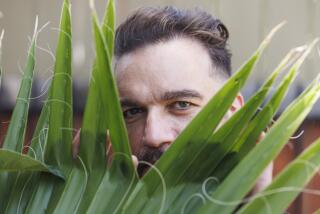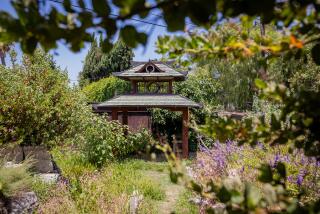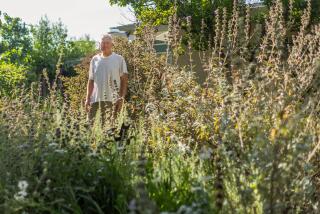The Lessons of Orgolini’s City Garden
Someone has stolen Charlie Turner’s Christmas tree.
And his hose. Graffito upon graffiti are constant leavings. Vandals beheaded a mature ginkgo tree planted as a memorial. Then topped the magnolias.
“It seems to be getting worse every year,” Charlie said. “You try to get used to it . . . but it was a perfect little Christmas tree and all I’ve got is a hole in the ground.”
He thought about graffiti by the layer and the naked vagrant who takes a cold-water bath whenever Charlie refills the horse trough: “If it got too much you’d say to hell with it. But I can’t. You just know you’ve got to go on because what else are you going to do?”
There’s a better question: Without Charlie Turner, what else would the gentle and discerning do with the frosty mornings and summer afternoons they spend hiking to a sanctuary called Dante’s View?
The View is on a high slope of Mt. Hollywood overlooking Griffith Park Observatory and downtown stress. Dante Orgolini, a Brazilian-born Italian journalist and muralist, climbed here in 1965 and scraped out an arboretum from unkempt chaparral. The city decided to play monkey in the middle, seeing absolutely no evil in the fine care-taking.
With cultivation came stands of eucalyptus, magnolia, jade, leggy poinsettias grown from Christmas gifts, many disciples and an unhired hand named Charlie Turner.
Dante died in 1978, at 73. Charlie inherited Orgolini’s garden of winding walkways and private moments. He is 81. As Orgolini cultivated community, a place above metropolitan grubbiness for those of sturdy legs and clean lungs, so has Turner turned an example.
“I’m a role model for a lot of people,” Charlie stated. “I’m an example for older people who might be dragged into thinking that life and fitness stop at 50 or with retirement. I show younger people how to escape everything down there, especially loneliness.”
Charlie knows much about loneliness. His parents died before his seventh birthday. He sailed alone from Liverpool to Canada to work farms in Manitoba, hamburger joints in Ontario and the Royal Canadian Air Force in France during World War II.
Charlie (“I never married because I’m a happy loner”) came to Los Angeles in 1952 and clerked until he was 70. Retirement scared him. “For the first time I could see the end, I could see people actually looking forward to staying home and watching television.”
Fortunately, Charlie was a runner and a window box gardener and as sure as God made little green thumbs, there came the day when Charlie hiked Griffith and found Orgolini’s garden.
“It was the most fortunate thing that has ever happened to me. Because if you can get up in the morning with somewhere to go, with something to do and with friends to see. . . .”
Charlie’s friends are indeed a wonderful lot. They include the younger and purer generation who run daily, sleep nights and shop at Mrs. Gooch’s. Yet dauntless seniors are the aristocracy.
The 60-year-olds with favorite walking sticks and berets.
The couples in their 70s who still hold hands and laugh together.
The 83-year-old in a 10-K T-shirt who outwalks her dog. And all those on the trail from the observatory parking lot who say good morning to strangers.
“Where,” Charlie asked, “would I ever go to meet people like this? I’m getting too much good out of this to ever give it up.”
So he gives by keeping the gardens, spending his minuscule pension on plants, planting saplings he will never see grow to maturity.
They, his regular irregulars, have given by arranging a city resolution, for mounting a bronze plaque to remember Orgolini, by passing the hat for Charlie’s 80th birthday present--a round trip ticket to Paris.
Together they enjoy pot-luck breakfasts early on Thursday and weekend mornings, their peace, their bond and a little wine at the whisper of any anniversary.
“When I die,” says Charlie, “I want to be cremated and have my ashes brought here.”
That’s what they did for Dante.
And an acacia tree has grown from where his ashes fell.






